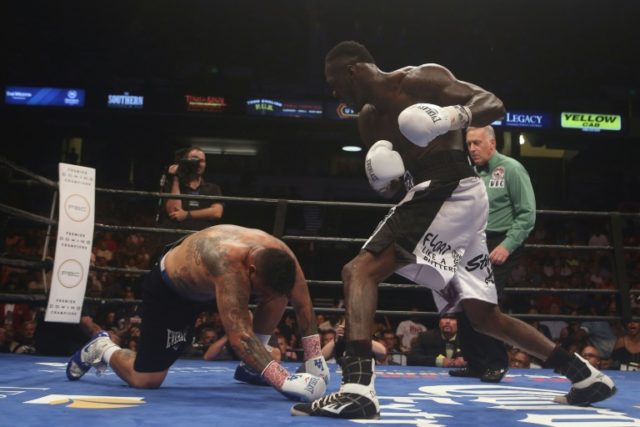Deontay Wilder delivered Budweiser to bars and pancakes to tables not too long ago. This weekend, he delivered pain.
The towering heavyweight battered Chris Arreola into retiring on the stool after the eighth round, when the Californian’s corner quit for him. But before he effectively closed the show, Deontay Wilder put on a show.
In the third and seventh, his hips shimmied as Arreola landed body shots, eventually answering the challenger with a wake-up uppercut. Wilder circled his wrists in bolo-punch fashion in the fourth. He responded to repetitive Arreola punches with repetitive “Wooo” exclamations in the seventh.
Deontay Wilder played games with Chris Arreola this weekend until he didn’t.
The Alabaman delighted the home crowd by knocking Arreola down in the fourth with a hard right followed by a succession of swarming punches. He hurt the contender-turned-gatekeeper often and cut him occasionally. He accomplished all this with a torn biceps and broken hand. After the eighth, Arreola cornerman Henry Ramirez offered the most redundant line of the night: “He’s done.”
Wilder employs impressive footwork for a six-foot-seven specimen, unleashes a flicking, pawing, and sometimes stiff jab to maintain distance, and effectively uses the torque awarded by his massive frame to knock out opponents—36 stoppages in 37 fights and for the 37-0 phenomenon. His gifts entice him to lazily drop his hands, which tends not to work well against the heavy hands of the heavyweight division. It’s a hole, albeit one not big enough for any past opponents to climb through.
In contrast to the lumbering Tyson Fury and the mechanical Wladimir Klitschko, Wilder fights with grace, energy, and explosive power. Wilder puts opponents, not audiences, to sleep. No American heavyweight since Mike Tyson has cultivated such a mystique and stoked the interest of fight fans. And he does so not from dark gyms in Upstate New York but under the television lights on the networks in primetime, not as a compact ball of muscle but as a long and lanky tree of a man.
With the lineal heavyweight championship around the waist of Klitschkos, Lennox Lewis, and a mouthy Irish tinker for the last decade, Wilder puts a twist on the Great White Hope by fighting as the Great American Hope. Americans, contrary to the claims of her critics, love heavyweight champions of any color. It’s the ones with foreign accents they don’t particularly care for.
Wilder, sporting a sweet Southern drawl and a vicious overhand right, hopes to rid us of this annoyance with a fight against the winner of Fury-Klitschko II. Another annoyance, the alphabet-soup sanctioning bodies, hopes to keep annoying us with as many heavyweight “champions” as possible. Money talks. Whether the cash coming out of fans’ pockets or the cash going into the WBCWBAIBFWBO’s coffers speaks loudest in determining whether the heavyweight division finally gets a title bout forcing fight aficionados to stop everything and fork over fifty bucks remains for the accountants to determine.
Like boxers (see Chris Arreola imitating Monty Python and the Holy Grail‘s Black Knight on Saturday night), boxing rarely sees its own best interests. WBC sanctioning fees may take a hit with a Wilder-Fury or Wilder-Klitschko fight. But the Alabaman’s bank account surely does not. And what’s good for a boxer’s bottom line is usually good for boxing’s bottom line. But that makes too much sense for a sport so lacking in it for so long.

COMMENTS
Please let us know if you're having issues with commenting.